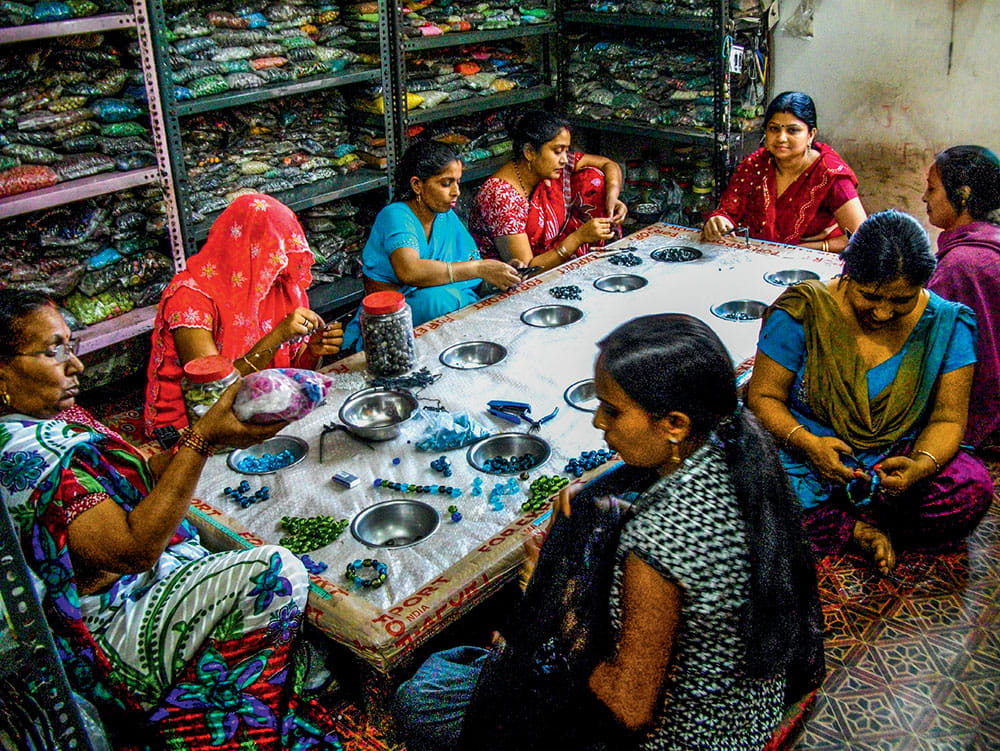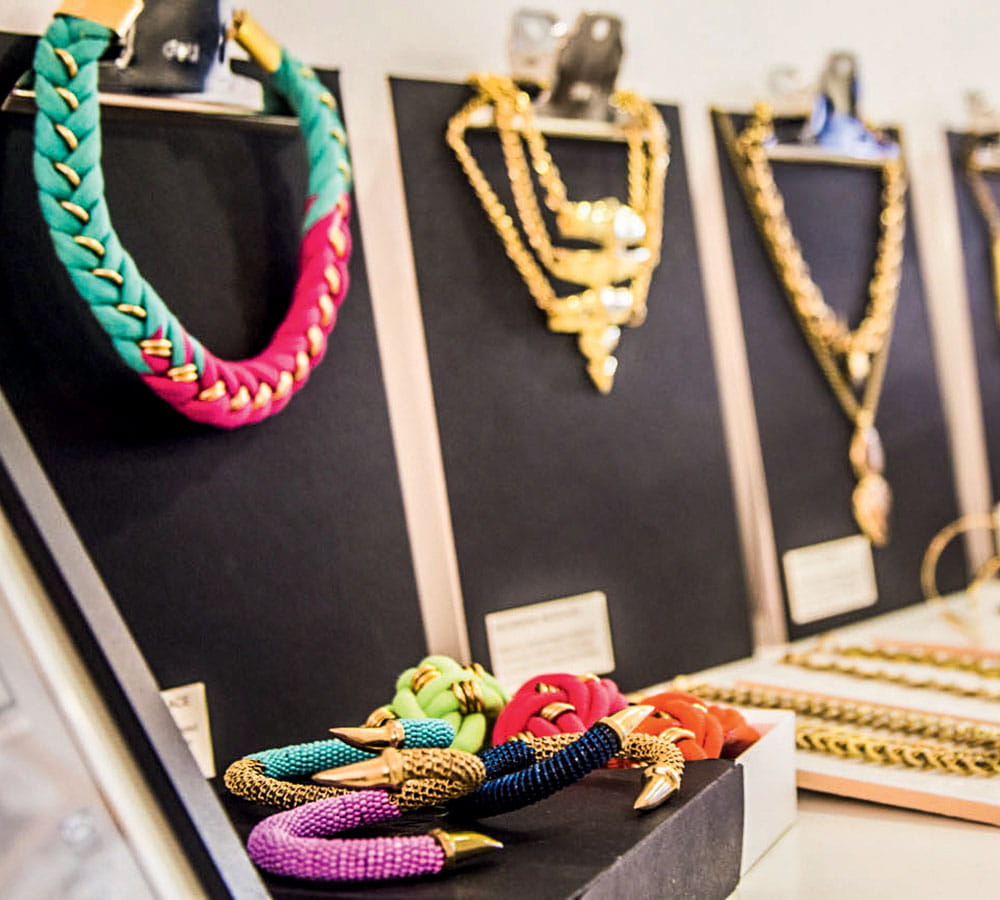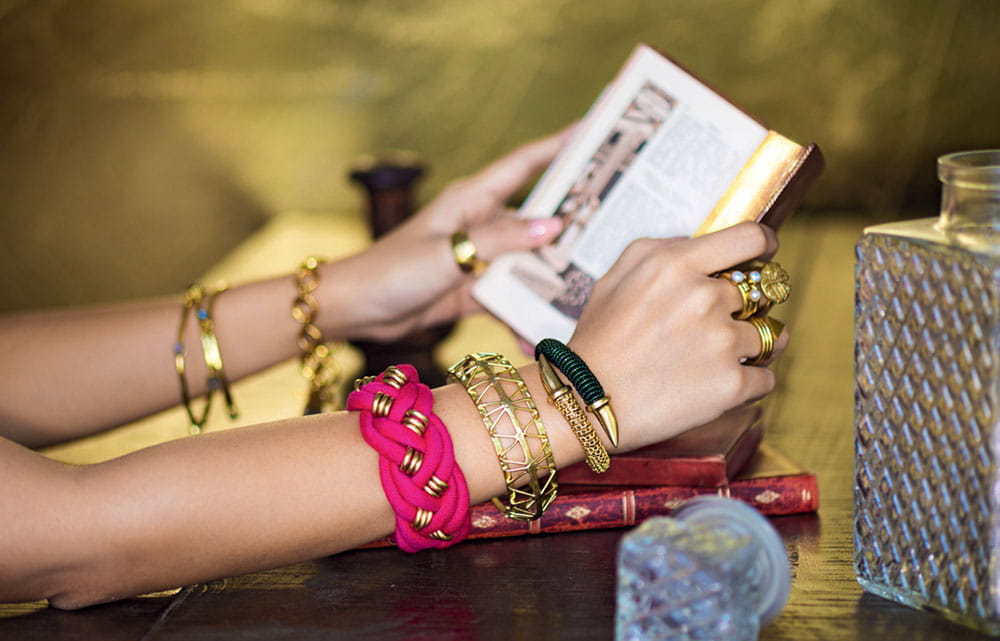Stories > Statement Pieces
Statement Pieces
Singapore-based social enterprise Anchora Collections helps women look and feel good through its fair trade jewellery made by underprivileged artisans around the world.
BY KAREN TEE
PHOTOS ANCHORA COLLECTIONS
ingaporean Cheryl Ou is proving that beauty is more than just skin-deep with Anchora Collections, a social enterprise she started which sells fair trade jewellery made by artisans from around the world.
Anchora’s fair trade commitment means the jewellery artisans from countries such as India, Indonesia, Cambodia and Kenya are employed by organisations that pay them sustainable wages and ensure safe working conditions.

In the rural village of Meerut, India, women artisans assemble fair trade jewellery in a workshop.
Ou is also the co-founder of The Nail Social, a social enterprise nail salon in Singapore that trains and hires women from disadvantaged backgrounds in the country.
Anchora is sold online as well as at the salon, which has a retail space stocked with flowers, food and drinks from socially conscious companies that believe in giving back to society. Ou’s previous experience of working in a business venture – with an investor who was only motivated by money – made her decide that there was more to running a business than just chasing after profits.
“By working with a fair trade organisation and getting paid fair wages, the artisans and their families benefi t because they get better salaries compared to working in factories.”
Nimul Nhok, general manager of Cambodian-run social enterprise Rajana
She started Anchora in 2014 to introduce a wider range of contemporary fair trade jewellery to Singapore. It works with reliable fair trade organisations in developing countries such as India, Indonesia, Cambodia and Kenya to engage artisans, most of whom are women or mothers, to create rings, bracelets, necklaces and other forms of jewellery. Ou adds: “We work with producers or workshops that commit to providing jobs to marginalised workers, to help them move from a position of vulnerability to security and economic self-sufficiency.”
The jewellery on offer is thoughtfully designed to fit into a modern woman’s wardrobe. They range from exclusive commissions only sold by Anchora to signature pieces designed by artisans. Many of the materials used are recycled or repurposed. For instance, some Kenyan pieces are made with discarded cow horn, while some jewellery from Cambodia are made from repurposed unexploded land mines.

A brass necklace made from recycled bombshell.
By bringing quality fair trade jewellery to Singapore, Ou hopes to dispel the common misconception that such items are “poorly made and badly designed”. She says: “Most of my customers appreciate the jewellery for its design and quality first, and are then pleasantly surprised to find out they are fair trade.”
Through her interactions with customers at the store, she is also able to introduce the working process of the artisans to them and educate them on the effort that goes into the making of each piece.
FAIR TREATMENT
Prices for Anchora jewellery range from S$30 for a brass ring to S$115 for a necklace made of cotton and recycled brass. Ou acknowledges that pieces by Anchora are pricier than highstreet costume jewellery. This is because she has committed to paying artisans a fair wage, to ensure they are able to stay self-sufficient. The items also cost more as they are handcrafted rather than mass-produced, she adds.
Although it has been a challenge to convince customers to support fair trade or socially conscious products because the items are slightly more expensive, Ou says that the effort is worth it, especially when the artisans are able to reap the benefits of their labour.
“By working with a fair trade organisation and getting paid fair wages, the artisans and their families benefit because they get better salaries compared to working in factories,” says Nimul Nhok, the general manager of Rajana, a Cambodian-run social enterprise that works with Cambodian artisans to produce contemporary jewellery and other handmade craft. It supplies jewellery to Anchora. She adds: “They are able to care for their families, and their children get a better education.”
When Ou first launched the brand, she made it a point to visit workshops in Cambodia, India and Indonesia to ensure that the artisans work in safe conditions and are indeed the recipients of the money earned through the sale of the jewellery. “I’ve heard horror stories of how some organisations claim they are ‘fair trade’ only as a marketing gimmick,” she says.

Using mainly recycled or repurposed materials, many of Anchoraʼs pieces are designed to fi t into any modern womanʼs wardrobe
During one of these visits, she met Nhok, who shared with her how her life had been transformed through Rajana. Born to a poor family, Nhok had dropped out of school at an early age and joined Rajana about 10 years ago. Her life improved through the years, and she is now paying it forward by providing opportunities to help other beneficiaries who are in a similar situation as her previously.
Nhok’s story has motivated Ou to continue building such networks so she can reach out to more marginalised artisans around the world. She recalls a trip to India where she visited some of the artisans at home. “In some of the villages in India, it’s considered shameful for women to leave the house to work as that means the husband is incapable of supporting the family. So supervisors from the fair trade organisations bring materials for them to work from home,” she says.
“No matter how little they had or how small their houses were, they welcomed me with open arms and treated me to tea and snacks. They even offered to teach me how to make jewellery. It was very heartening to see how much pride they have in their work.”
Ou hopes her efforts will lead to bigger things in the future for the artisans. She says: “Before I approached them, they were mostly selling their wares within the local markets. Taking their products overseas will hopefully give them more exposure and lead to more opportunities. It will also help them to realise that their work has global appeal.”
Today, Biomax is the only company in the world that can convert waste into organic fertiliser on an industrial scale in 24 hours. “Unlike traditional methods of bio-digestion or composting, which take weeks or even months, our technology takes just 24 hours,” says Anton Wibowo, operations director at Biomax. Although other companies also produce digesters – machines in which biological reactions occur to convert waste to fertiliser – the speed of their processes cannot match that of Biomax. Their capacity is also limited to below one tonne, while Biomax can process up to 50 tonnes of waste per day in one digester.
ECO-FRIENDLY TECHNOLOGY
Its technology has immense potential in agricultural countries that depend on expensive fertiliser for their crops, such as Malaysia, Thailand, Turkey and Kenya. It is in use across a range of industries, from palm oil milling and poultry farming to natural dye manufacturing in these countries.
Agricultural communities also benefit from greater cost savings and improved crop yield through the use of fertiliser produced with Biomax’s technology. For instance, rice farmers in Myanmar increased their yield by 20 per cent and spent less on fertiliser when they switched to its organic fertiliser.

Anchora Collections also carries bracelets and rings with East African influences, including bracelets woven from colourful kikoi, a traditional fabric from East Africa.
Due to the short lead time, Biomax’s technology requires little land space, making it suitable for use in cities like Singapore. A digester with a conversion capacity of 15 tonnes of waste per day occupies just 40sqm. The Grand Hyatt Singapore, for instance, has adopted Biomax’s technology to help keep food waste out of the country’s landfills. “By converting organic waste into high-quality fertiliser, we divert the waste from the landfills, minimise the amount of greenhouse gases produced, and reduce the need for chemicals to fertilise farms,” says Wibowo. Its technology also emits less greenhouse gases than composting. About 460kg of carbon dioxide is produced through composting one tonne of waste, compared to 165kg of carbon dioxide generated with the Biomax process.
Wibowo adds: “Besides minimising carbon emissions, we hope to create a valuable end product that goes back to the soil and to farms. We are closing the loop in the food production cycle. This is important because relying on minerals or chemical inputs for food production is not sustainable in the long-term.”
